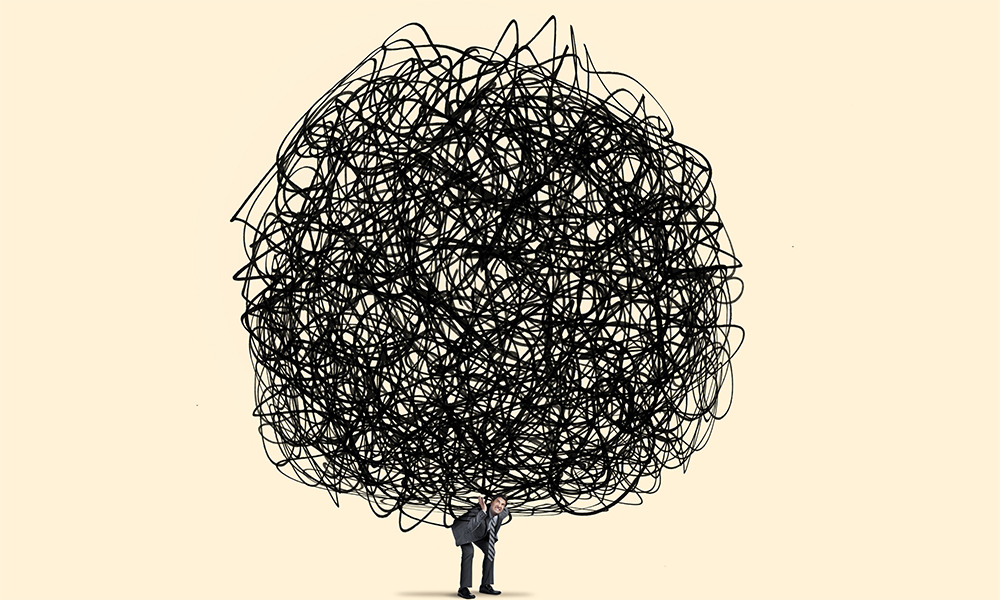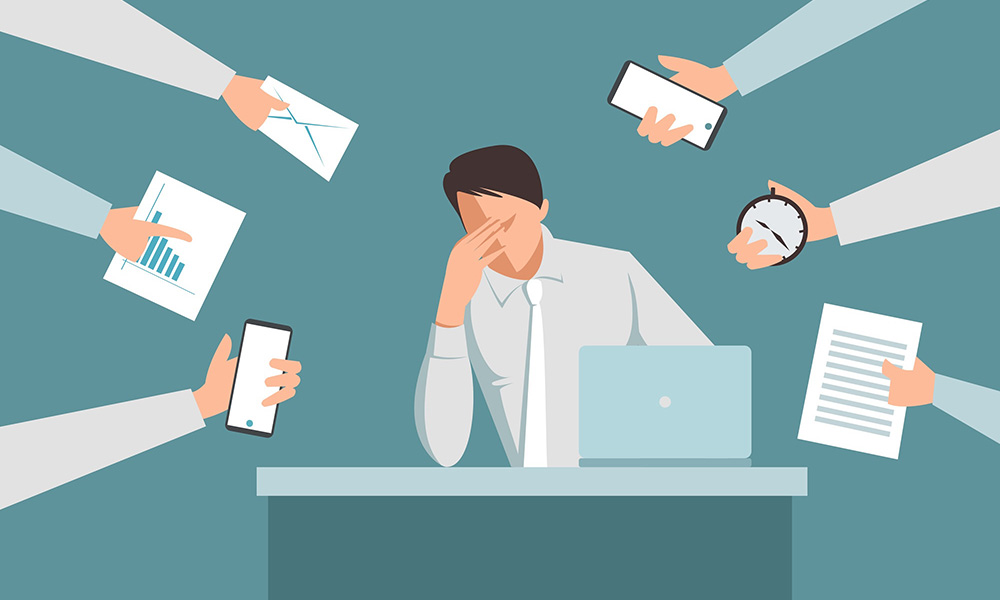I was catching up recently with a team member. He was feeling very stressed. After an hour of venting, he said that he was feeling much better after unloading what was on his mind. I was glad that I was able to listen to and absorb some of his frustrations. That evening, however, I kept on ruminating about our conversation. And for the next few hours, I felt drained myself.
You know the dangers of secondhand smoking – but have you heard of secondhand stress?
Stress, like tobacco smoke, isn’t limited to the person experiencing it. It’s contagious. Being in close quarters with a person who is stressed can cause you to experience anxiety. So, this week, my message focuses on secondhand stress. How does it work, what are the risks, and what can you do to protect yourself? And if you’re the one spreading stress at your workplace, what steps can you take to break this unhealthy pattern?
Research shows that emotional contagion is hardwired into our brains. When we see someone smile, the mirror neurons in our mind are activated and we also smile. When we see someone yawn, we also yawn. The same reaction applies to negativity and stress as well.
Several studies have found that simply observing someone who is visibly anxious can elevate your levels of cortisol (stress hormones) and impact your entire nervous system.
In this way, we “pick up” feelings of worry, frenzy and panic from the people around us, whether in the office, at home or even when we’re out and about. As Shawn Achor, researcher and author of The Happiness Advantage, explains:
When your taxi driver honks angrily, you can carry his anxiety all the way to work. When a boss hurriedly stalks into a room, you can pick up her stress as you try to present your ideas. Even bankers on trading floors separated by glass walls can pick up the panic of a person across the room working in a separate market just by seeing their nonverbals.
An article in the Wall Street Journal explains that chronic rushers trigger a variety of responses in their colleagues, including:
- Anxiety: “Maybe I should be rushing around too.”
- Inferiority: “Maybe my stuff isn’t as important as his.”
- Resentment: “Are you trying to show you’re more important than me?”
A single stressor can disrupt the rhythm of an entire group. Imagine a meeting where one colleague hurtles in at the last second and spends the entire time tapping their pen agitatedly, worriedly looking at their phone, or looking as if they can’t wait to get to the next thing on their agenda. Such behaviours would surely impact the tenor of the discussion in a negative way.
Managers often operate at a breakneck pace, which can trigger a sense of frenzy in their teams. People start to feel that working in a calm, poised manner simply isn’t good enough – busyness is the key to being viewed as a strong performer. This problem is even worse in open-plan offices where everyone can see everyone, and employees feel a desire to “keep up with the Joneses”.
The negative effects of stress are well-documented: these include feeling overwhelmed, irritable, or restless, a lack of creativity, sluggish thinking, demotivation and exhaustion. Stress also manifests in physical ways such as headaches, muscle tension, elevated blood pressure and interrupted sleep.
If you work in close proximity to an anxiety-inducing colleague, it’s important to take steps to safeguard your own mental and physical wellbeing. Here are seven suggestions to help you cope with secondhand stress:
1. Inoculate yourself.
Before starting the workday or walking into a stressful situation, replenish your reservoir of gratitude and happiness. This will go a long way towards inoculating you against any anxiety or negativity you might encounter. Try one of the following: think of three things you’re grateful for that day; listen to your favourite upbeat song; do a two-minute meditation; or send a quick email giving thanks or praise to a co-worker.
2. Respond with positivity.
Positive behaviours can help to neutralise the harmful effects of secondhand stress. A piece in the Harvard Business Review suggests the following:
Instead of returning a harried coworker’s stressed nonverbals with an equally stressed grimace of your own, return it with a smile or a nod of understanding…. The first comment in a conversation often predicts the outcome. Try to start your phone calls not with “I’m swamped” or “I’m so busy.” Instead, start with a breath and calmly say: “It’s great to talk to you.”
3. Bolster self-esteem.
If you tend to second-guess your own abilities, you’re more likely to feel insecure or resentful in the presence of an always-busy colleague. Operating from a place of strength and conviction can be an excellent stabilising influence. Those who have high self-confidence are less reactive to other people’s moods. There are several pathways to increasing self-esteem, including coaching, celebrating small victories, and even exercising (working out releases endorphins, which in turn boost self-confidence).
4. Offer assistance.
Empathy offers a powerful tool to keep your own emotions in check. Achor recommends engaging with a stressed-out colleague in the following way:
By expressing compassion for this person’s concern and then engaging them in positive conversation – either to generate a solution to their problem or shift their focus away from it – we often positively influence them instead of solely letting them negatively affect us.
5. Look beyond your to-do list.
Lists are an excellent productivity tool but we must resist the temptation to view an endless to-do list as a badge of honour. What you accomplish by EOD today is not the be-all and end-all – it is simply a way for you to achieve your big picture goal. Instead of thinking about your workload solely in terms of daily calls, meetings and presentations, bring greater focus to your long-term objectives and career aspirations.
6. Seek out positive influences.
Positive feelings are just as contagious as negative ones. Instead of letting chronic rushers or worriers govern your mood, make an effort to be around co-workers who make you feel optimistic about work. If needed, limit your interactions with anxiety-inducing team members, at least temporarily.
7. Reframe stress.
Interestingly, researchers have found that changing your mindset about stress actually changes its impact. When you stop fighting stress as a threat, you experience a 23% drop in its negative effects! Instead, approach it as a means to increase mental toughness, heighten awareness, unlock new perspectives and deepen your relationships. Achor also suggests:
Instead of fighting and being frustrated at negative people around you, take it as an opportunity to feel compassion or a challenge to help that person become more positive.
Are you a source of secondhand stress?
Do the behaviours mentioned above ring a bell for you personally? If so, here are three steps you can take to stop being a source of secondhand stress for your colleagues:
1. Take a breath.
Stress spreads through things like loud volume, accelerated pace of speech, and being distracted while talking to someone. Take an intentional approach towards altering these behaviours. When you’re speaking to co-workers, remember to take a breath, slow down and regulate your volume. Try to tune out distractions (including looking at screens and thinking about the next item on your to-do list) and be fully present in the conversation.
2. Upskill where needed.
At its core, constant busyness usually stems from an inability to prioritise tasks or manage your time effectively. Identify the root cause behind your stress, so you can start tackling it and get out of firefighting mode. Not only will this lower your stress but also elevate your performance. Key skills to learn include differentiating between urgent vs. important, learning to say “no”, carving out time for deep work, and building buffers into your schedule.
3. Inoculate your team members.
If you’re a manager, your stressed-out behaviours have likely spread to your team as well. As you work towards becoming calmer and more strategic, it’s important to let them know they can slow down. Share learnings from your own journey and make it clear that performance is measured by outcomes (not busyness).
While it may be difficult to cut yourself off entirely from the rush, anxiety and negativity of certain co-workers, you can certainly limit their impact on yourself. Tweaking your approach to stress, refilling your positivity tank, and staying grounded in the big picture are all good ways to safeguard your wellbeing and productivity.








Comments